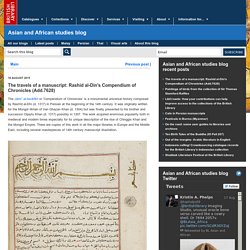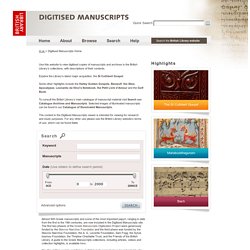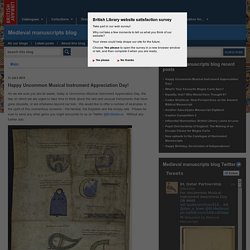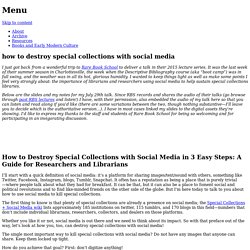

Guide to OA monograph publishing » OAPEN-UK. The travels of a manuscript: Rashid al-Din's Compendium of Chronicles (Add.7628) The Jāmiʿ al-tavārīkh or ‘Compendium of Chronicles’ is a monumental universal history composed by Rashīd al-Dīn (d. 1317) in Persian at the beginning of the 14th century.

It was originally written for the Mongol Ilkhan of Iran Ghazan Khan (d. 1304) but was finally presented to his brother and successor Oljaytu Khan (d. 1317) possibly in 1307. The work acquired enormous popularity both in medieval and modern times especially for its unique description of the rise of Chinggis Khan and the Mongol Empire. There are copies of this work in all the major libraries in Europe and the Middle East, including several masterpieces of 14th century manuscript illustration.
Heading in the hand of Shah Rukh’s third son Baysunghur (1397-1433). Sultan Muhammad's seal is stamped in the margin (British Library Add.7628, f. 410v) BL Asian and African sur Twitter : "Baysunghur’s calligraphy in our new blog at #Timurids #IslamicArt #BLPerMss. From Hindu Paintings to Hebrew Manuscripts - the Digital Treasures of the Bodleian Library. Digitised Manuscripts. Almost 900 Greek manuscripts and some of the most important papyri, ranging in date from the first to the 18th centuries, are now included in the Digitised Manuscripts site.

The first two phases of the Greek Manuscripts Digitisation Project were generously funded by the Stavros Niarchos Foundation and the third phase was funded by the Stavros Niarchos Foundation, the A. G. Leventis Foundation, Sam Fogg, the Sylvia Ioannou Foundation, the Thriplow Charitable Trust, and the Friends of the British Library. A guide to the Greek Manuscripts collections, including articles, videos and collection highlights, is available here. Bodleian Libraries sur Twitter : "From Hindu Paintings to Hebrew Manuscripts - the Digital Treasures of the Bodleian Library: Search. Bodleian Libraries sur Twitter : "A rare Cornish manuscript, recording early surviving play scripts on Radio 4's Making History:
Leonardo da Vinci Drawings. Zooniverse. Happy Uncommon Musical Instrument Appreciation Day! As we are sure you are all aware, today is Uncommon Musical Instrument Appreciation Day, the day on which we are urged to take time to think about the rare and unusual instruments that have gone obsolete, or are otherwise beyond our ken.

We would like to offer a number of examples in the spirit of this momentous occasion - the familiar, the forgotten and the simply odd. Please be sure to send any other gems you might encounter to us on Twitter @BLMedieval. Without any further ado: Folio with musical instruments, from a leaf from a giant Bible, Italy, 11th-12th century, Add MS 47683, f. 1v Detail of a man with bells among musical neumes, from the Gradual of Saint-Etienne of Toulouse, France (Toulouse), last quarter of the 11th-first quarter of the 12th century, Harley MS 4951, f. 299v Detail of two musicians playing the rebec and cithar, from the Worms Bible, Germany (Frankenthal), 2nd-3rd quarter of the 12th century, Harley MS 2804, f. 3v. Medieval Manuscripts sur Twitter : "It's that day of the year when we celebrate uncommon musical instruments. Really!
How to destroy special collections with social media. I just got back from a wonderful trip to Rare Book School to deliver a talk in their 2015 lecture series.

It was the last week of their summer season in Charlottesville, the week when the Descriptive Bibliography course (aka “boot camp”) was in full swing, and the weather was in all its hot, glorious humidity. I wanted to keep things light as well as make some points I feel very strongly about: the importance of librarians and researchers using social media to help sustain special collections libraries. Below are the slides and my notes for my July 29th talk. Since RBS records and shares the audio of their talks (go browse through past RBS lectures and listen!)
I have, with their permission, also embedded the audio of my talk here so that you can listen and read along if you’d like (there are some variations between the two, though nothing substantive—I’ll leave you to decide which is the authoritative version…). How do you achieve that goal? … voilà! Medieval Manuscripts sur Twitter : ""The French Language Runs Throughout The World" A guest-post on our Medieval Manuscripts Blog. Medieval Francophone Literary Culture Outside France. Oxford’s online Bodleian archive: illumination for all. I’ve got a secret vice.

I love to visit rare book rooms and leaf through the pages of 16th-century traveller’s tales or 15th-century editions of Petrarch with their brilliantly coloured pictures. Once, I even found a design by Botticelli in a religious tract in the British Library. This is not actually as criminal or difficult as it sounds. I was researching a book at the time and all the yellow-leafed volumes whose pictures I pored over in the rare books room at St Pancras were more or less relevant to it. Anyone with a British Library pass can do the same.
One way libraries are opening their secret worlds to everyone is by putting some of their most curious or majestic items online.